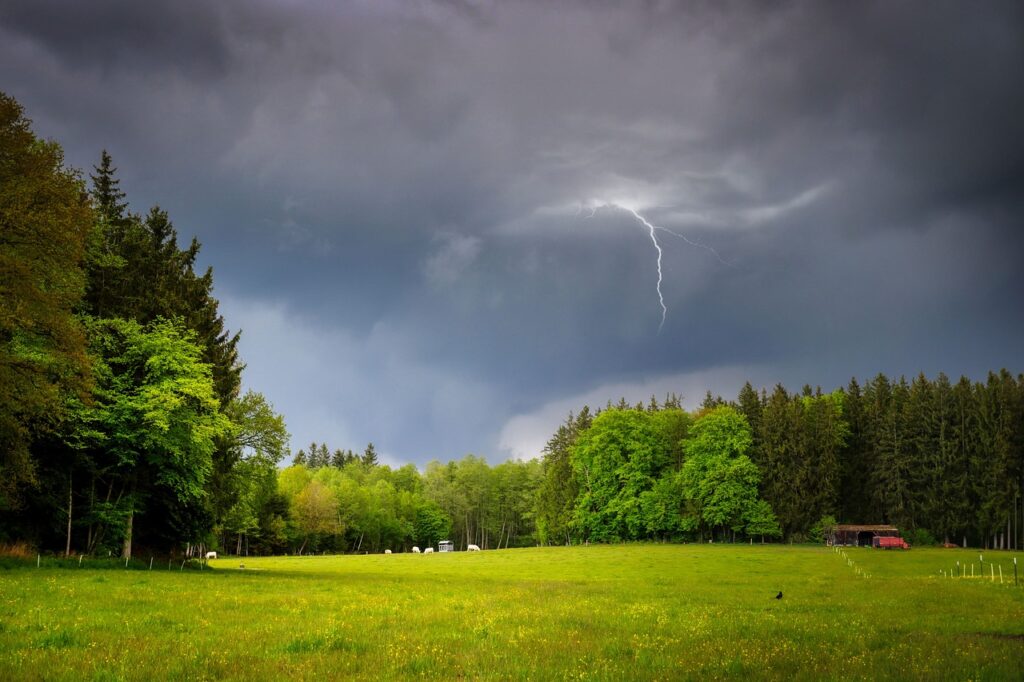Today, I was shopping in the local farmer’s market. The weather was beautiful and energising – high pressure prevailed, cloudless skies vibrated with blueness, and the air was the perfect Goldilocks temperature – not too hot and not too cold. The light itself was sparkling. The food on display looked bright, shiny and appetising. Some stalls had tasting samples. Everything was pinging with flavour.
I have tasted wines en plein air in similar conditions on many occasions and remarked on how they seem to taste more alive, more energetic. Perhaps, our appetite is sharper when we are in a lighter environment. Perhaps we are responding on a subliminal level to all the variations in temperature, light, and pressure.
Does weather have an effect on the way wine tastes in itself? While it is considered that atmospheric pressure and even humidity can affect the perception of wine, it is nearly impossible to establish this as a scientific fact. While I might notice the difference both generally and specifically in the way the wine is tasting, each individual’s perception is unique, and it would be difficult “prove” it beyond doubt to someone who doesn’t observe these differences.
Perhaps, our appetite is sharper when we are in a lighter environment. Perhaps we are responding on a subliminal level to all the variations in temperature, light, and pressure.
If we were able to test the proposition, how would one even measure relative deliciousness? And when examining wine perception at that level, one would also need to factor in the variegated background factors that may or may not affect how a wine tastes: the relative lighting on each occasion, background noise, our focus at the precise moment, our diets, our general health (and how we feel on the day), and, of course, good old-fashioned bottle variation.
Largely, we rely on anecdotal evidence and our tasting experience of the same wines during relatively high and low barometric pressures. On one occasion, for example, I tasted half a dozen red Burgundies with an experienced importer whose palate I had great respect for and always showed me wines with notable for their balance and precision . After pouring the first three, he furrowed his brow and said: I think we should stop. The wines are upset.” He was right. Each wine was out of sorts. And the weather? A low pressure day, windy, bitterly cold. Since that day, I have used this as an example for wines being discombobulated. I have witnessed this phenomenon many times, wherein a wine may taste dramatically different. This day, happy and shiny, that day dumb and almost metallic, correlating (if not caused by) evident differences in atmospheric pressure.
Normally, we do not talk about the weather, because it seems like making an excuse for an underperforming wine, but it is a critical factor in the way we taste.
Expectations and intimate knowledge of the wine also play a role. The Burgundy producer who lives with their wine from day to day, is more intuitively acutely aware of its relative mood (if you like) than the visiting critic who passes a snapshot judgement. Normally, we do not talk about the weather, because it seems like making an excuse for an underperforming wine, but it is a critical factor in the way we taste. We react to weather and changes in barometric pressure in ways that we may scarcely realise.
Our mood certainly affects the way we taste. Once I was being interviewed by a friend for a book she was writing. We agreed to do the interview outside on top of a hill overlooking central London, one of best vistas in the city. I uncorked a bottle of white Burgundy, and we fell into animated conversation. There were loads of other people present – it is a spot where ley lines meet – supposedly. If one were a fanciful disposition one could say that this is a place which attracts people by virtue of its particular energy. That afternoon the sky was ominous with dark-grey clouds scudding over us interspersed with occasional shafts of light. The wind began to whip up. We sensed that a storm might be on the way. There was something exhilarating about being exposed in this restlessly-changing environment and the wine positively shimmered as if in tune with the restless elements. It was as if the hilarity of the crowd of people on the brow of the hill combined with the natural phenomena around us, sharpened our response to the wine in question.
Weather is part of the mood music that can enhance or disrupt the quality of the taste experience. For want of a better way of putting it, when you feel more alive, the wine tastes more alive.


